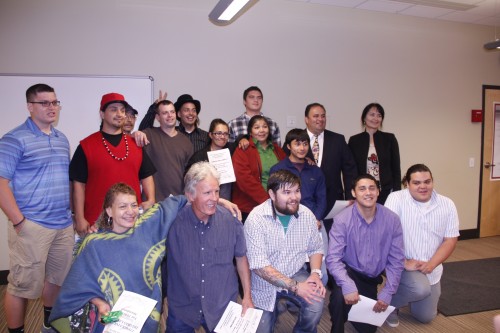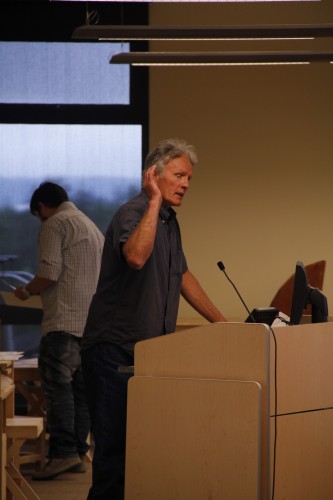
By Andrew Gobin, Tulalip News
TULALIP – Tulalip TERO celebrated the first graduating class of the new TERO Construction Training Center June 12. Students graduating at the TCTC celebratory lunch showcased their final projects. Tribal leaders, program staff, former staff, and students shared words about what the day meant.
“What you’re doing here is building a foundation for your careers,” began Tim Wilson, a program manager for the Department of Labor and Industry. “There is nothing in this world you can’t do if you put your mind to it. This foundation you’ve built will help in that.”
Wilson congratulated the students, and honored them and staff for the work to make the TCTC program a successful reality.
“I was on the phone the other day, talking to someone back in D.C., and we were discussing national issues and apprenticeship. I was able to say, ‘Well guess what. I’ve got the first tribal pre-apprenticeship program,’ and there was silence on the line,” he said.
Tulalip’s new TCTC program is the first state recognized pre-apprenticeship program fully operated by a tribal entity. Washington State Labor Board categorized it as a “pre-apprentice” program , whose graduates are qualified to join various trade unions and their respective apprenticeship programs. Upon completion of the coursework students are ready to safely enter the construction work environment.
“This program is a learning opportunity for our members and other Native Americans. It gives our people a chance to learn a trade and contribute to the building of our community. Many of the program’s graduates go on to full employment with our tribal construction department, or with one of the many construction companies in the region,” said Tulalip Tribes Chairman Herman Williams. “We’re very proud of those who have completed the first year of our newly recognized pre-apprentice program.”
The Tulalip Construction Training program has been in existence for over a decade and over the years has been managed by both the Tulalip College Center and The Tribal Employment Rights Office (TERO) and has also been funded by different grants. This past year it reverted to TERO management and with the change has come a shift in emphasis from simply providing the vocational training program to advocating and helping with job placement after students complete the program and exposuring students to the various trades through speakers from trade unions and representatives from certification programs. If students choose to stick with the trades as a career pathway they can expect to make a good living.
The Tulalip Tribes operates the TCTC in partnership with Edmonds Community College, offering training in the construction trades to its members, as well as other Native Americans, in order to help them obtain the necessary skills to enter the job market
“Edmonds Community College is proud to be a partner with the Tulalip Tribes in providing this opportunity for students to acquire job-ready skills in the Construction Industry Training program,” said Andy Williams from the Edmonds Community College business program. “Many of the graduates earn employment in the construction trades upon graduation, earning good wages and contributing to the economy and the community. This is a great educational model initiated by the Tulalip Tribes, and Edmonds Community College is honored to participate.”
TERO program staff, past and present, could not be more proud of their students, honoring the work they were able to accomplish.
The ten week course provides students instruction in the basics of the construction trade. Students are also awarded a flagging certification, First AID/CPR, and an OSHA 10 Hour Safety Card. In addition to these necessary construction skills, at the Tulalip TCTC students learn a set of values to guide and drive them towards successful careers.

Photo: Andrew Gobin/Tulalip News
Mark Newland one of the instructors for the program, has worked with TERO for many years, formerly with the NACTEP program, offered some final words of guidance to his students. “I don’t worry about my reputation, I worry about my character. Because if you take care of your character, your reputation will take care of itself.”
Newland was praised for his dedication to the program, called “the soul of this organization, and a great role model.”
He talked about the pride the students should feel not only about the work they’ve done for themselves, but what it means for years to come, saying, “One of the great things about being a carpenter is, for the next 20 years, you will drive by a project and be able to say to yourself, ‘Hey…I did that.’ That is something to be proud of.”
Andrew Gobin is a staff reporter with the Tulalip News See-Yaht-Sub, a publication of the Tulalip Tribes Communications Department.
Email: agobin@tulalipnews.com
Phone: (360) 716.4188




